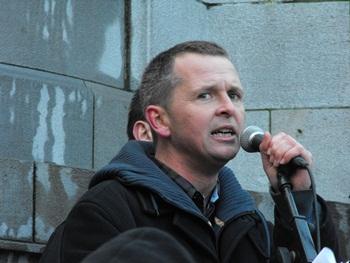Recent Irish protests pale in comparison to our European neighbours

Despite the concerted efforts of left-wing activists, community groups and movements like Claiming Our Future, Ireland's protest movement appears to be waning. While some might argue this is down to a political apathy peculiar to Ireland, many consider the media and organisations such as Ictu and the USI to be serious obstacles to widespread resistance. By Alison Spillane
Over a hundred people protested outside Leinster House yesterday evening against the IMF-EU deal, the terms of which were the subject of discussion in the Dáil yesterday.
Among the speakers at the rally were People Before Profit's Richard Boyd Barrett, secondary school student Shane Donnelly and Mariana Carneiro, editor of the Left Bloc newspaper in Portugal.
There was a sharp contrast between the small crowd on Kildare Street and events in Athens yesterday where 20,000 people took part in an anti-austerity march. It was also a very different scene in Rome where tens of thousands marched as Prime Minister Silvio Berlusconi faced two no-confidence votes in parliament.
Although Berlusconi won the confidence vote in the Senate with a comfortable majority (162 to 135), he only narrowly survived Tuesday's vote in the lower house of parliament by a very slim margin of three votes (314 to 311). Berlusconi's victory has triggered violent clashes between police and protestors on the streets of the Italian capital.
Speakers at the Dublin protest told the crowd not to be disheartened by the low turnout and emphasised the need for organisation at a grassroots level which, they said, would grow into a larger movement of resistance against the 'savage' cutbacks in Budget 2011; the National Recovery Plan; and the IMF-EU bailout.
Richard Boyd Barrett (pictured) criticised the mainstream media – singling out RTE – for presenting the deal with the EU and the IMF as a 'rescue' plan.
Boyd Barrett said that this plan was in no way a rescue package; he stressed the track record of the IMF in other countries where State assets are sold-off and public services privatised.
The People Before Profit councillor also drew attention to the role of the Opposition parties, particularly Fine Gael and Labour, in the Dáil debate. He said that while both parties would vote against the budget and the loan package negotiated with the EU and the IMF by the current government, neither would reverse the cuts or the terms of the deal once in power.
Boyd Barrett supported this assertion with reference to Labour leader Eamon Gilmore's recent statements on the Late Late Show where he said that he would not reverse cuts implemented by Fianna Fáil and the Greens should he become Taoiseach after the general election, likely to be held in March.
Gilmore argues that Irish people have had enough of the "politics of promises" – the implication perhaps being that he will not promise voters to reverse cuts when he may not be able to follow through on such a commitment once in office.
The Irish Congress of Trade Unions (Ictu) came in for strong criticism with speakers targeting General Secretary David Begg and SIPTU General President Jack O'Connor in particular. Begg's position as a Director of the Central Bank was put forward as proof of the vested interests of union leaders.
Some of the speakers said Ictu and Jack O'Connor could not be relied upon to call a general strike. The majority of unions (Unite a notable exception) were accused of occasionally staging reluctant protests in order to pacify the masses and keep people in their place.
One is reminded of Sunday Times journalist Sarah McInerney's recent comments on the Tonight with Vincent Browne show (7 December) to the effect that a general strike would be "irresponsible" and that people should protest on their own time.
Leaving Cert student Shane Donelly who led last week's walkout against the budget in Moyle Park College Clondalkin, questioned the role of the Union of Students in Ireland (USI), particularly its leader Gary Redmond. A recent profile in Phoenix magazine described the USI President thus:
"As UCDSU president, Redmond earned a reputation as someone who wouldn't rock the boat. He had a very good relationship with the university authorities and was even asked by the college to run for a second term as UCDSU president. One indication of Redmond's conformist credentials was his proposal to overturn a college ban on selling Coca Cola.
This ban had been introduced in 2003 in protest against the multinational's alleged involvement in paramilitary murders in Columbia, in solidarity with Columbian trade unionists. Redmond proposed a referendum on whether the ban should be overturned; a narrow majority of students agreed with him and voted to overturn the ban."
Other speakers condemned Redmond for criticising those who attempted to stage a sit-in at the Department of Finance during the national student protest at the beginning of November. At the sit-in several students were injured after the gardaí responded aggressively to what was largely a peaceful protest.
A week later a crowd of more than 600 took part in a peaceful march against the actions of An Garda Síochána during the demonstration of 3 November. Redmond was invited to attend but, again, chose to disassociate himself and the USI from what he described as "antisocial behaviour".
Many of the speakers stressed that workers, the unemployed, and students must organise together to fight against austerity measures. Portugese activist Mariana Carneiro spoke about the need for solidarity between citizens across Europe. She said that whilst general strikes at a national level were very important, a joint strike across Europe was imperative.
Last night, the government won the Dáil vote on the €85 million EU-IMF bailout package by 81 votes to 75. The Dáil also passed the controversial Credit Institutions Bill with a vote of 78 to 71. The legislation, published on Tuesday, will give the Minister for Finance extensive powers for restructuring the banking sector.
